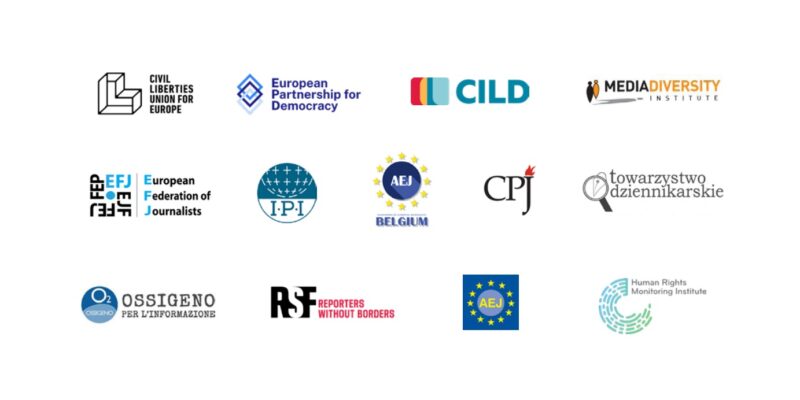EMFA: why do governments refuse to be transparent about their relations with media companies?

Thirteen journalists’, press freedom and civils society organisations, including the European Federation of Journalists (EFJ), are calling on EU Member States, the European Commission and the European Parliament to impose greater transparency on the media and their relations with political decision-makers and economic players. Citizens have a right to know. The current negotiations on the final version of the EMFA must incorporate these transparency guarantees. Read our open letter about the transparency of media ownership and state advertising.
Joint open letter on media ownership and state advertising transparency in the trilogue negotiations of the EMFA
The provisions of the European Media Freedom Act (EMFA) relating to media ownership and state advertising transparency fill a gap in media legislation because of the vacuum that exists at the European level. The lack of regulation created an environment where the beneficial owners of media outlets and their relationships to politicians and business interests were hidden. State advertising is underregulated, creating an environment that enables the subsidization of government-friendly media in several member states and the resulting inequitable media market.
Therefore, we strongly support the Report of the Committee on Culture and Education of the European Parliament, which includes wider and more effective provisions regarding transparency than the original proposal of the Commission or the position of the Council. Nevertheless, a broader scope of available information about media ownership and state advertising, and general access to them, is crucial to support media freedom and pluralism, and to ensure the economic growth and stability of the internal market.
Media ownership. Market specific transparency obligations for media service providers are an essential precondition of effective oversight of the market. Additional transparency obligations do not constitute discrimination against these actors. Sector-specific rules are frequently applied and considered as necessary, for example in the financial, agricultural, or chemical sectors. The media sector is, by nature, public facing and vital for democracy, the rule of law, and the internal market itself. It is therefore essential that citizens are adequately informed as to where their information is coming from.
Media ownership transparency will only be functional if all media, not only those providing news and current affairs content, are obliged to make ownership information available – a stance both the European Parliament and the Council support through the deletion of Article 6.3 of the EMFA. Providing ownership information is a manageable burden on media outlets, even for smaller ones, as they have similar obligations towards authorities, including tax and finance authorities, media authorities, or the registry courts. Transparency in media ownership could also safeguard against small disinformation hubs masquerading as media service providers and spreading disinformation under the radar.
All information on media ownership made publicly available must be accessible to everyone including to people living with disabilities. This should include the business and financial interests or activities of the media’s direct, indirect and beneficial owners in other businesses, including their links to politically exposed persons. It is only through unlimited access to this data that potential political interference and conflicts of interest may come to light. The EMFA should not limit the availability of this information.
For these transparency obligations to be effective, it is necessary to establish and keep up-to-date national databases of media ownership, which feed information into an EU-wide database. Such an approach will help ensure that data on media ownership is readily and easily available, and that governments and regulatory authorities can make informed decisions regarding market and financial matters, such as funding attribution, mergers, or allocating state aid.
State advertising. Only broad transparency obligations supported by national and EU-wide databases will fully address the need for information on state advertising in media. The claim that wide-reaching transparency of state advertising in media will cause smaller governments to stop funding local media and, as a direct effect, such media to cease existing, must be debunked. It is logical that an initial investment of time will be necessary, however, the process of reporting should be straight-forward and user-friendly. In any case, public authorities are already obliged to keep records of their advertising expenditure and uploading this information to an online database should in itself not require much further effort nor time.
While the European Parliament’s stance on state advertising transparency is overall proportional, it does not deal with emergency messages in an adequate manner. Emergency messages do require a certain exemption from the general rules, owing to their specific nature. However, it is not sufficient for the transparency obligations to apply to emergency messages after the state of emergency has ended as they can last for years, with or without cause. This is why transparency requirements under Art. 24.2 and 24.3 should become applicable to emergency messages no later than 6 months after the adoption of the emergency measures in question, as proposed by the Opinion of the Committee on Civil Liberties, Justice and Home Affairs.
Signed:
- Civil Liberties Union for Europe
- European Partnership for Democracy
- Italian Coalition for Civil Liberties and Rights (CILD)
- Media Diversity Institute (MDI)
- European Federation of Journalists (EFJ)
- International Press Institute (IPI)
- Association of European Journalists (AEJ Belgium)
- Committee to Protect Journalists
- Society of Journalists, Warsaw
- Ossigeno.info
- Reporters Without Borders (RSF)
- Association of European Journalists (International Federation)
- Human Rights Monitoring Institute
PDF version, here.






